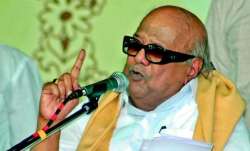RIP Karunanidhi: Kalaignar's contribution to cinema and literature
'Kalaignar' Karunanidhi's contribution to Indian cinema remains unparalleled and exceptional. Let's look back at DMK patriarch's journey in Tamil cinema as a screenwriter.

DMK’s Chief M Karunanidhi also fondly known as Kalaignar (An Artist) breathed his last on Tuesday in Chennai. Kauvery Hospital made an official announcement that he has passed away. He breathed his last on 6:10 pm. Despite the rigorous efforts by the doctors and his medical team, they were unable to save him. The DMK patriarch was 94. While the country mourns the loss of its Kalaignar, let’s have a look at Kalaignar’s unparalleled contribution towards Tamil film industry.
Despite his political interests, Karunanidhi forayed into many fields in his life. He is an author of number of books, including Romapuri Pandian, Thirukkural Urai, Thanpandi Singam, Vellikizhamai and Ponnar Shankar among others. Also, he wrote the song ‘Semmozhiyaam Tamizh Mozhiyaam’ for World Classical Tamil Conference in 2010, to which AR Rahman lent his music.
He began his career as a screenwriter in the Tamil film industry in 1947 with Rajakumari which was bankrolled by a Coimbatore based Jupiter Pictures. It featured M.G. Ramachandran in the lead role. During those times, Ramachandran and Karunanidhi shared great rapport before turning into rivals in later years of politics.
He went on making films with M.G. Ramachandran including Marudhanaattu Ilavarasi and Abhimanyu. In late 1949, he was roped in as a screenwriter for the film Manthiri Kumari which also starred Ramachandran. It went on becoming a blockbuster hit later.
However, Karunanidhi’s most notable work remains Parasakthi. It is touted to be a turning point in Tamil cinema. It inhabited the ideologies of the Dravidian movement and introduced two major actors Sivaji Ganesan and S.S. Rajendran to Tamil cinema. The movie was later surrounded by controversies and faced censorship troubles. The film eventually released in 1952 becoming a massive hit at the box office. The movie was opposed by orthodox Hindus since it contained elements that criticised Brahmanism.
Other two movies written by Kalaignar Karunanidhi were Panam, which threw light on sensitive topics like widow remarriage, abolition of untouchability, self-respect marriages, abolition of zamindari and abolition of religious hypocrisy.